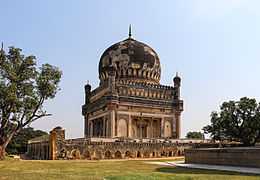Muhammad Quli Qutb Shah
| Muhammad Quli Qutb Shah | |
|---|---|
| The Fifth Sultan of Qutb Shahi dynasty | |
|
Muhammad Quli Qutb Shah's portrait from the collection of the Smithsonian Institution | |
| Reign | 1580–1611 |
| Predecessor | Ibrahim Quli Qutb Shah |
| Successor | Sultan Muhammad Qutb Shah |
| House | House of Hashim/Banu Hashim(Parent house),Qutb Shahi (Sub branch ) |
| Father | Ibrahim Quli Qutb Shah |
| Born |
1565 Golkonda, Hyderabad, Mughal India (now in Telangana State, India) |
| Died |
11 January 1612 Daulat Khan-e-Ali Palace, Hyderabad, Mughal India (now in Telangana State, India) |
Muhammad Quli Qutb Shah (1580–1612 CE) (Urdu: محمد قلی قطب شاہ) was the fifth sultan of the Qutb Shahi dynasty of Golkonda and founded the city of Hyderabad, in South-central India and built its architectural centerpiece, the Charminar. He was an able administrator and his reign is considered one of the high points of the Qutb Shahi dynasty.He ascended to the throne in 1580 at the age of 15 and ruled for 31 years.

Birth and early life
Muhammad Quli Qutub Shah was the third son of Ibrahim Quli Qutb Shah Wali. He was an accomplished poet and wrote his poetry in Persian, Telugu and Urdu.[1] As the first author in the Urdu language he composed his verses in the Persian diwan style, and his poems consisted of verses relating to a single topic, gazal-i musalsal.[1] Muhammad Quli's Kulliyat comprised 1800 pages, over half were gazals, qasidas on one hundred pages, while the rest contained over 300 pages of matnawi and martiyas.[1]

City of Hyderabad
Hyderabad was built on the southern bank of the Musi River in 1591. Muhammad Quli Qutub Shah called architects from Iran to lay out the city, which was built on a grid plan. Hyderabad was named after his beloved wife Bhagamati, who was bestowed the title Hyder Mahal by the sultan.[2] Muhammad Quli Qutub Shah also constructed the Charminar, the most recognizable symbol of Hyderabad.
Patronage of literature
Quli Qutb Shah was a scholar of Arabic, Persian and Telugu languages. He wrote poetry in Urdu, Persian, and Telugu. His poetry has been compiled into a volume entitled "Kulliyat-e-Quli Qutub Shah." Muhammed Quli Qutub Shah had the distinction of being the first Saheb-e-dewan Urdu poet[3] and is credited with introducing a new sensibility into prevailing genres of Persian/Urdu poetry.
| Preceded by Ibrahim Quli Qutb Shah |
Qutb Shahi dynasty 1518–1687 |
Succeeded by Sultan Muhammad Qutb Shah |
Notes
- ↑ 1.0 1.1 1.2 Annemarie Schimmel, Classical Urdu Literature from the Beginning to Iqbāl, (Otto Harrassowitz, 1975), 143.
- ↑ Mir Ayoob Ali Khan, TNN (22 March 2010). "For Hyderabadis, Bhagmati is vital part of history". Times of India (Hyderabad). Retrieved 26 December 2013.
- ↑ "Quli Qutub Shah remembered on his 400th death anniversary". The Siasat Daily. 14 January 2012. Retrieved 26 December 2013.
References
- Sangaychay Mala by Gajanan Pole
- Prime Ministers of Qutubshhs by Sri Bhopal Rao
- Luther, Narendra. Prince, Poet, Lover, Builder: Muhammad Quli Qutb Shah, The Founder of Hyderabad
- Books on Muhammad Quli Qutb Shah
- Chopra, R.M., The Rise, Growth And Decline of Indo-Persian Literature, Iran Culture House, New Delhi, 2012.
External links
| Wikimedia Commons has media related to Muhammad Quli Qutb Shah. |
|